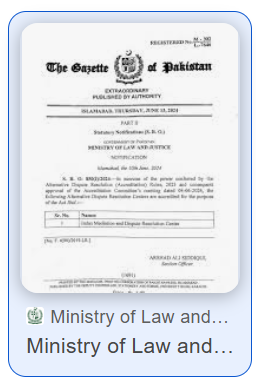In recent years, mediation has emerged as a vital tool in Pakistan’s legal system, offering a practical alternative to traditional litigation. As the country grapples with an overburdened judiciary, mediation provides a pathway to efficient and amicable dispute resolution. In this blog post, we will explore the role of mediation in Pakistan’s legal framework, its benefits, and its potential to transform the justice delivery system.
What is Mediation?
Mediation is a voluntary and confidential process where a neutral third party, known as a mediator, facilitates communication between disputing parties to help them reach a mutually acceptable agreement. Unlike litigation, mediation emphasizes collaboration, allowing parties to retain control over the outcome of their disputes.
The Legal Framework for Mediation in Pakistan
Statutory Recognition
In recent years, Pakistan has passed mediation laws such as the Punjab Alternative Dispute Resolution Act 2019 and the Sindh Alternative Dispute Resolution Act 2017, which provide a legal framework for mediation. These laws encourage parties to use mediation as a first step to resolve their disputes before resorting to litigation. The laws also provide for the establishment of mediation centers and training programmes for mediators. The Code of Civil Procedure (CPC), 1908, was amended to include Alternative Dispute Resolution (ADR) mechanisms, including mediation. Section 89-A of the CPC encourages courts to refer disputes for mediation, promoting faster resolution of cases.
Role of Courts
Pakistan’s judiciary actively supports mediation through court-annexed mediation centers. These centers, established in key cities, are designed to handle disputes referred by courts. Judicial officers and trained mediators work together to facilitate the process.
Specialized Laws
In addition to general provisions, specialized laws such as the Family Courts Act, 1964, and the Industrial Relations Act, 2012, also incorporate mediation as a viable dispute resolution mechanism, especially in family and labor disputes.
Benefits of Mediation
Efficiency
One of the most significant advantages of mediation is its efficiency. Cases that might take years to resolve through litigation can often be settled within weeks through mediation.
Cost-Effectiveness
Mediation is considerably less expensive than traditional court proceedings. The savings in time and resources make it an attractive option for individuals and businesses alike.
Preserving Relationships
Unlike adversarial litigation, mediation fosters cooperation and understanding, making it particularly effective in family and commercial disputes where preserving relationships is crucial.
Flexibility
The informal nature of mediation allows parties to craft solutions tailored to their unique circumstances, something that rigid court procedures often cannot achieve.
Challenges to Mediation in Pakistan
While mediation holds immense promise, it faces several challenges in Pakistan, including:
- Lack of Trained Mediators: The availability of skilled mediators remains limited, hindering the ability to meet the growing demand for mediation services effectively.
- Lack of Awareness: Many individuals and businesses remain unaware of mediation and its benefits.
- Cultural Resistance: Traditional reliance on litigation and adversarial dispute resolution methods creates resistance to adopting mediation.
- Limited Resources: A shortage of trained mediators and well-established mediation centers hinders widespread adoption.
- Enforcement Issues: Ensuring compliance with mediated agreements can sometimes be challenging, especially in the absence of robust legal enforcement mechanisms.
- Resistance from Lawyers: Many legal professionals view mediation as a threat to their income opportunities, leading to hesitance in promoting or supporting its use.
The Future of Mediation in Pakistan
To realize its full potential, mediation in Pakistan requires concerted efforts from all stakeholders, including the judiciary, legal professionals, and civil society. Key steps to enhance the role of mediation include:
- Awareness Campaigns: Educating the public about mediation through seminars, workshops, and media campaigns.
- Training Programs: Developing a cadre of skilled mediators through professional training programs and certifications.
- Legislative Reforms: Strengthening the legal framework for mediation to ensure consistency and enforceability of agreements.
- Integration with Technology: Leveraging online dispute resolution platforms to make mediation more accessible.
Conclusion
Mediation is a promising solution to the challenges faced by Pakistan’s legal system. By promoting efficiency, cost-effectiveness, and harmony, it can transform the way disputes are resolved in the country. With increased awareness, better resources, and robust legal support, mediation has the potential to become a cornerstone of Pakistan’s justice delivery system.


